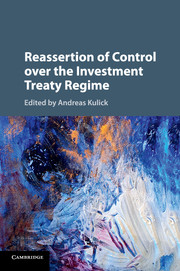Book contents
- Frontmatter
- Contents
- List of Contributors
- Preface
- PART I Introduction, Theory and Domestic Law Approaches
- PART II Procedural Aspects and Avenues of Reassertion
- PART III Substantive Aspects and Avenues of Reassertion
- 7 Masters of Puppets? Reassertion of Control through Joint Investment Treaty Interpretation
- 8 Systemic Integration: An Instrument for Reasserting the State's Control in Investment Arbitration?
- 9 Reasserting Control through Withdrawal from Investment Agreements: What Role for the Law of Treaties?
- 10 Legitimate Regulatory Interests: Case Law and Developments in IIA Practice
- 11 State Controls over Available Remedies in Investor-State Arbitration
- PART IV Reassertion of Control: Policy and Trends
- Index
11 - State Controls over Available Remedies in Investor-State Arbitration
from PART III - Substantive Aspects and Avenues of Reassertion
Published online by Cambridge University Press: 12 January 2017
- Frontmatter
- Contents
- List of Contributors
- Preface
- PART I Introduction, Theory and Domestic Law Approaches
- PART II Procedural Aspects and Avenues of Reassertion
- PART III Substantive Aspects and Avenues of Reassertion
- 7 Masters of Puppets? Reassertion of Control through Joint Investment Treaty Interpretation
- 8 Systemic Integration: An Instrument for Reasserting the State's Control in Investment Arbitration?
- 9 Reasserting Control through Withdrawal from Investment Agreements: What Role for the Law of Treaties?
- 10 Legitimate Regulatory Interests: Case Law and Developments in IIA Practice
- 11 State Controls over Available Remedies in Investor-State Arbitration
- PART IV Reassertion of Control: Policy and Trends
- Index
Summary
The emergence of other actors in the international system means that the observer has to take these changes into account and may consider that in certain domains (e.g. economic relations) other actors may often function more effectively than states. But the state is still, and in the foreseeable future will remain (notwithstanding the relative decline of its strength), the main and the most powerful actor … [States] still provide the chief institution through which societies will try to respond to change.
Traditionally, arbitration has been used for disputes in which the issues are legal and the desire to improve relations makes the idea of a binding settlement handed down by a third party attractive … [A] further advantage of arbitration is that the parties define the question or questions they want the tribunal to answer and can also specify the basis of its decision.
A. Introduction: State Power in Investor-State Arbitration
The shifting balance of power between States and foreign investors has always been a central theme in the ongoing debate over the content and force of international investment law. In the decolonisation era, it was critical to newly independent States and former colonies regaining their independence to emphasise the ‘full permanent sovereignty of every State over its natural resources and all economic activities’, alongside their power of ‘regulation and supervision of the activities of transnational corporations, by taking measures in the interest of the national economies of the countries where such transnational corporations operate on the basis of the full sovereignty of those countries’. In contemporary debates involving investor-State dispute settlement procedures for new behemoth economic agreements such as the recently concluded Trans-Pacific Partnership (TPP) and the proposed Trans-Atlantic Trade and Investment Partnership (TTIP), there has been a growing narrative expressing discontent that States are somehow becoming powerless, taken advantage of or otherwise short-changed by the predatory acts of foreign investors able to seek direct recourse against States to challenge their regulatory actions through investor-State arbitration.
- Type
- Chapter
- Information
- Reassertion of Control over the Investment Treaty Regime , pp. 259 - 282Publisher: Cambridge University PressPrint publication year: 2016
- 1
- Cited by



